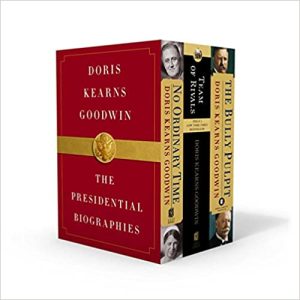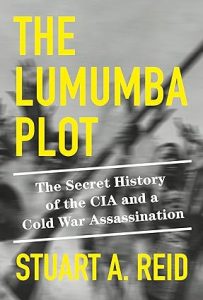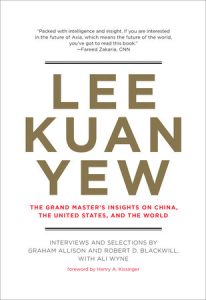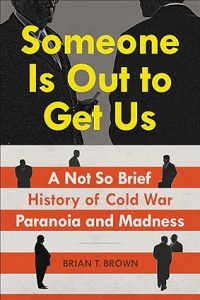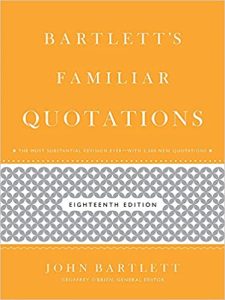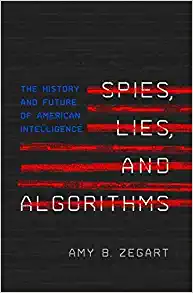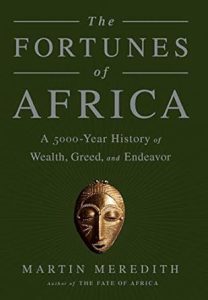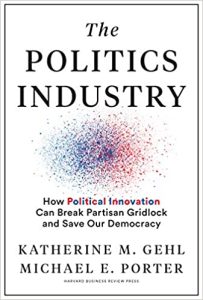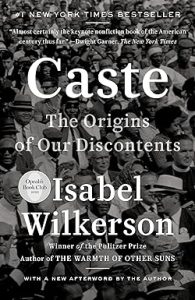Nine Lives
₦35,000.00“Nine Lives” offers a deeply personal perspective on Nigeria’s military history, particularly during the regimes of Muhammadu Buhari and Sani Abacha. These periods were marked by egregious human rights violations, economic struggles, and social unrest, and through his memoir, Bello-Fadile provides a unique lens through which to better understand this complex chapter in Nigeria’s past.
The Presidential Biographies
₦35,000.00After five decades of acclaimed studies of the presidency, Doris Kearns Goodwin stands as America’s premier presidential historian. Now, for the first time, her three most esteemed books are collected in one beautiful box set.
No Ordinary Time:
Winner of the Pulitzer Prize for History, No Ordinary Time relates the story of how Franklin D. Roosevelt, surrounded by a small circle of intimates, led the nation to victory in World War II and with Eleanor’s essential help, changed the fabric of American society.
Team of Rivals:
The landmark biography of Abraham Lincoln, adapted by Steven Spielberg into the Academy Award-winning film Lincoln, and winner of the prestigious Lincoln Prize, illuminates Lincoln’s political genius as he brought disgruntled opponents together and marshaled their talents to the task of preserving the Union.
The Bully Pulpit:
The prize-winning biography of Theodore Roosevelt—a dynamic history of the first decade of the Progressive era when the nation was coming unseamed and reform was in the air. Told through the friendship of Roosevelt and William Howard Taft, Goodwin captures an epic moment in history.
The Lumumba Plot
₦30,000.00It was supposed to be a moment of great optimism, a cause for jubilation. The Congo was at last being set free from Belgium—one of seventeen countries to gain independence in 1960 from ruling European powers. At the helm as prime minister was charismatic nationalist Patrice Lumumba. Just days after the handover, however, the Congo’s new army mutinied, Belgian forces intervened, and Lumumba turned to the United Nations for help in saving his newborn nation from what the press was already calling “the Congo crisis.” Dag Hammarskjöld, the tidy Swede serving as UN secretary-general, quickly arranged the organization’s biggest peacekeeping mission in history. But chaos was still spreading. Frustrated with the fecklessness of the UN and spurned by the United States, Lumumba then approached the Soviets for help—an appeal that set off alarm bells at the CIA. To forestall the spread of Communism in Africa, the CIA sent word to its station chief in the Congo, Larry Devlin: Lumumba had to go.
Within a year, everything would unravel. The CIA plot to murder Lumumba would fizzle out, but he would be deposed in a CIA-backed coup, transferred to enemy territory in a CIA-approved operation, and shot dead by Congolese assassins. Hammarskjöld, too, would die, in a mysterious plane crash en route to negotiate a cease-fire with the Congo’s rebellious southeast. And a young, ambitious military officer named Joseph Mobutu, who had once sworn fealty to Lumumba, would seize power with U.S. help and misrule the country for more than three decades. For the Congolese people, the events of 1960–61 represented the opening chapter of a long horror story. For the U.S. government, however, they provided a playbook for future interventions.
Lee Kuan Yew
₦25,000.00When Lee Kuan Yew speaks, presidents, prime ministers, diplomats, and CEOs listen. Lee, the founding father of modern Singapore and its prime minister from 1959 to 1990, has honed his wisdom during more than fifty years on the world stage. Almost single-handedly responsible for transforming Singapore into a Western-style economic success, he offers a unique perspective on the geopolitics of East and West. American presidents from Richard Nixon to Barack Obama have welcomed him to the White House; British prime ministers from Margaret Thatcher to Tony Blair have recognized his wisdom; and business leaders from Rupert Murdoch to Rex Tillerson, CEO of Exxon Mobil, have praised his accomplishments. This book gathers key insights from interviews, speeches, and Lee’s voluminous published writings and presents them in an engaging question and answer format.
Lee offers his assessment of China’s future, asserting, among other things, that “China will want to share this century as co-equals with the U.S.” He affirms the United States’ position as the world’s sole superpower but expresses dismay at the vagaries of its political system. He offers strategic advice for dealing with China and goes on to discuss India’s future, Islamic terrorism, economic growth, geopolitics and globalization, and democracy. Lee does not pull his punches, offering his unvarnished opinions on multiculturalism, the welfare state, education, and the free market. This little book belongs on the reading list of every world leader.
Someone Is Out To Get Us
₦20,000.00In Someone Is Out to Get Us, Brian T. Brown explores the delusions, absurdities, and best-kept secrets of the Cold War, during which the United States fought an enemy of its own making for over forty years — and nearly scared itself to death in the process. The nation chose to fear a chimera, a rotting communist empire that couldn’t even feed itself, only for it to be revealed that what lay behind the Iron Curtain was only a sad Potemkin village.
In fact, one of the greatest threats to our national security may have been our closest ally. The most effective spy cell the Soviets ever had was made up of aristocratic Englishmen schooled at Cambridge. Establishing a communist peril but lacking proof, J. Edgar Hoover became our Big Brother, and Joseph McCarthy went hunting for witches. Richard Nixon stepped into the spotlight as an opportunistic, ruthless Cold Warrior; his criminal cover-up during a dark presidency was exposed by a Deep Throat in a parking garage.
Someone Is Out to Get Us is the true and complete account of a long-misunderstood period of history during which lies, conspiracies, and paranoia led Americans into a state of madness and misunderstanding, too distracted by fictions to realize that the real enemy was looking back at them in the mirror the whole time.
Bartlett’s Familiar Quotations
₦20,000.00More than 150 years after its original publication, Bartlett’s Familiar Quotations has been completely revised and updated for its eighteenth edition. Bartlett’s showcases a sweeping survey of world history, from the times of ancient Egyptians to present day.
New authors include Warren Buffett, the Dalai Lama, Bill Gates, David Foster Wallace, Emily Post, Steve Jobs, Jimi Hendrix, Paul Krugman, Hunter S. Thompson, Jon Stewart, Elizabeth Kubler-Ross, Barack Obama, Che Guevara, Randy Pausch, Desmond Tutu, Julia Child, Fran Leibowitz, Harper Lee, Nassim Nicholas Taleb, Patti Smith, William F. Buckley, and Robert F. Kennedy.
In the classic Bartlett’s tradition, the book offers readers and scholars alike a vast, stunning representation of those words that have influenced and molded our language and culture.
The Scandal Of The Century
₦19,000.00From one of the titans of twentieth-century literature, collected here for the first time: a selection of his journalism from the late 1940s to the mid-1980s–work that he considered even more important to his legacy than his universally acclaimed works of fiction.
“I don’t want to be remembered for One Hundred Years of Solitude or for the Nobel Prize but rather for my journalism,” Gabriel García Márquez said in the final years of his life. And while some of his journalistic writings have been made available over the years, this is the first volume to gather a representative selection from across the first four decades of his career–years during which he worked as a full-time, often muckraking, and controversial journalist, even as he penned the fiction that would bring him the Nobel Prize in 1982.
Here are the first pieces he wrote while working for newspapers in the coastal Colombian cities of Cartagena and Barranquilla . . . his longer, more fictionlike reportage from Paris and Rome . . . his monthly columns for Spain’s El País. And while all the work points in style, wit, depth, and passion to his fiction, these fifty pieces are, more than anything, a revelation of the writer working at the profession he believed to be “the best in the world.”
The New China Playbook: Beyond Socialism and Capitalism
₦18,000.00China’s economy has been booming for decades now. A formidable and emerging power on the world stage, the China that most Americans picture is only a rough sketch, based on American news coverage, policy, and ways of understanding.
Enter Keyu Jin: a world-renowned economist who was born in China, educated in the U.S., and is now a tenured professor at the London School of Economics. A person fluent in both Eastern and Western cultures, and a voice of the new generation of Chinese who represent a radical break from the past, Jin is uniquely poised to explain how China became the most successful economic story of our time, as it has shifted from primarily state-owned enterprise to an economy that is thriving in entrepreneurship, and participation in the global economy.
China’s economic realm is colorful and lively, filled with paradoxes and conundrums, and Jin believes that by understanding the Chinese model, the people, the culture and history in its true perspective, one can reconcile what may appear to be contradictions to the Western eye.
What follows is an illuminating account of a burgeoning world power, its past, and its potential future.
The Fortunes Of Africa
₦18,000.00A sweeping history the fortune seekers, adventurers, despots, and thieves who have ruthlessly endeavored to extract gold, diamonds, and other treasures from Africa and its people.
Africa has been coveted for its rich natural resources ever since the era of the Pharaohs. In past centuries, it was the lure of gold, ivory, and slaves that drew merchant-adventurers and conquerors from afar. In modern times, the focus of attention is on oil, diamonds, and other rare earth minerals.
In this vast and vivid panorama of history, Martin Meredith follows the fortunes of Africa over a period of 5,000 years. With compelling narrative, he traces the rise and fall of ancient kingdoms and empires; the spread of Christianity and Islam; the enduring quest for gold and other riches; the exploits of explorers and missionaries; and the impact of European colonization. He examines, too, the fate of modern African states and concludes with a glimpse of their future.
His cast of characters includes religious leaders, mining magnates, warlords, dictators, and many other legendary figures-among them Mansa Musa, ruler of the medieval Mali empire, said to be the richest man the world has ever known.
The Politics Industry
₦17,500.00The truth is, the American political system is working exactly how it is designed to work, and it isn’t designed or optimized today to work for us—for ordinary citizens.
Most people believe that our political system is a public institution with high-minded principles and impartial rules derived from the Constitution. In reality, it has become a private industry dominated by a textbook duopoly—the Democrats and the Republicans—and plagued and perverted by unhealthy competition between the players. Tragically, it has therefore become incapable of delivering solutions to America’s key economic and social challenges. In fact, there’s virtually no connection between our political leaders solving problems and getting reelected.
In The Politics Industry, business leader and path-breaking political innovator Katherine Gehl and world-renowned business strategist Michael Porter take a radical new approach. They ingeniously apply the tools of business analysis—and Porter’s distinctive Five Forces framework—to show how the political system functions just as every other competitive industry does, and how the duopoly has led to the devastating outcomes we see today.
Using this competition lens, Gehl and Porter identify the most powerful lever for change—a strategy comprised of a clear set of choices in two key areas: how our elections work and how we make our laws. Their bracing assessment and practical recommendations cut through the endless debate about various proposed fixes, such as term limits and campaign finance reform. The result: true political innovation.
The Politics Industry is an original and completely nonpartisan guide that will open your eyes to the true dynamics and profound challenges of the American political system and provide real solutions for reshaping the system for the benefit of all.
Caste
₦17,000.00In this brilliant book, Isabel Wilkerson gives us a masterful portrait of an unseen phenomenon in America as she explores, through an immersive, deeply researched, and beautifully written narrative and stories about real people, how America today and throughout its history has been shaped by a hidden caste system, a rigid hierarchy of human rankings.
Beyond race, class, or other factors, there is a powerful caste system that influences people’s lives and behavior and the nation’s fate. Linking the caste systems of America, India, and Nazi Germany, Wilkerson explores eight pillars that underlie caste systems across civilizations, including divine will, bloodlines, stigma, and more. Using riveting stories about people—including Martin Luther King, Jr., baseball’s Satchel Paige, a single father and his toddler son, Wilkerson herself, and many others—she shows the ways that the insidious undertow of caste is experienced every day. She documents how the Nazis studied the racial systems in America to plan their outcasting of the Jews; she discusses why the cruel logic of caste requires that there be a bottom rung for those in the middle to measure themselves against; she writes about the surprising health costs of caste, in depression and life expectancy, and the effects of this hierarchy on our culture and politics. Finally, she points forward to ways America can move beyond the artificial and destructive separations of human divisions, toward hope in our common humanity.
Original and revealing, Caste: The Origins of Our Discontents is an eye-opening story of people and history, and a reexamination of what lies under the surface of ordinary lives and of American life today.



